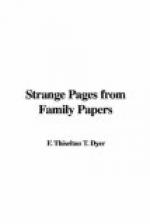In the mid-revels, the first
ominous night
Of their espousals, when the
room shone bright
With lighted tapers—the
king and queen leading
The curious measures, lords
and ladies treading
The self-same strains—the
king looks back by chance
And spies a strange intruder
fill the dance,
Namely, a mere anatomy, quite
bare,
His naked limbs both without
flesh and hair
(As he deciphers Death), who
stalks about,
Keeping true measure till
the dance be out.
Inexplicable, however, as the presence of this unearthly, mysterious personage was felt to be by all engaged in the marriage revels, it was regarded as the forerunner of some approaching catastrophe. Prophets and seers lost no time in turning the affair to their own interest, and amongst them Thomas the Rhymer predicted that the 16th of March would be “the stormiest day that ever was witnessed in Scotland.” But when the supposed ill-fated day arrived, it was the very reverse of stormy, being still and mild, and public opinion began to ridicule the prophetic utterance of Thomas the Rhymer, when, to the amazement and consternation of all, there came the appalling news, “The king is dead,” whereupon Thomas the Rhymer ejaculated, “That is the storm which I meant, and there was never tempest which will bring to Scotland more ill-luck.”
The disappearance of the heir to a property, which has always been a favourite subject with novelists and romance writers, has occasionally happened in real life, and a Shropshire legend relates how, long ago, the heir of the house of Corbet went away to the wars, and remained absent so many years that his family—as in the case of Enoch Arden—gave up all hope of ever seeing him again, and eventually mourned for him as dead. His younger brother succeeded to the property, and prepared to take to himself a wife, and reign in the old family hall.
But on the wedding day, in the midst of the feasting, a pilgrim came to the gate asking hospitality and alms. He was bidden to sit down and share the feast, but scarcely was the banquet ended when the pilgrim revealed himself as the long lost elder brother. The disconcerted bridegroom acknowledged him at once, but the latter generously resigned the greater part of the estates to his brother, and, sooner than mar the prospects of the newly married couple, he lived a life of obscurity upon one small manor. There seems, however, to be a very small basis of fact for this story. The Corbets of Shropshire—one branch of whom are owners of Moreton Corbet—are among the very oldest of the many old Shropshire families. They trace their descent back to Corbet the Norman, whose sons, Robert and Roger, appear in Domesday Book as holding large estates under Roger, Earl of Shrewsbury. The grandsons of Roger Corbet were Thomas Corbet of Wattlesborough, and Robert Corbet. Thomas, who was evidently the elder of the two, it seems went beyond seas, leaving his lands in the custody of his brother Robert. Both brothers left descendants, but the elder branch of the family never attained to such rank and prosperity as the younger one.” Hence, perhaps, the origin of the legend; but Moreton Corbet did not come into the possession of the family till long after this date.[15]




